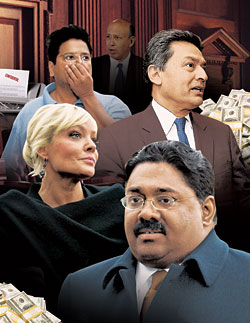 |
Clockwise from top left: Rajiv Goel, Lloyd Blankfein, Rajat Gupta, Raj Rajaratnam, and Danielle Chiesi.
(Photo: Lipo Ching/Mercury News (Goel); Jemal Countess/Getty (Blankfein); Umesh Goswam/The India Today Group/Getty (Gupta); Jin Lee/Bloomberg via Getty (Rajaratnam, Chiesi); Getty (courtroom); C Squared Studios/Getty (Confidential); Mark Scott/Getty (Money). Illustrations by Gluekit.) |
On March 19, 2008, at 8 P.M., Raj Rajaratnam, the billionaire co-founder of the Galleon Group, one of the world’s largest hedge funds, returned a call from his friend Rajiv Goel, an executive at Intel, the giant computer-chip maker. After a minute or two of good-ol’-boy banter, the conversation turned to business.
“Accha,” Goel said—Hindi for “listen up.” “I was supposed to meet Sriram”—Intel vice-president Sriram Viswanathan—“today. I didn’t. I got tired today, so I came home a little early. We had a meeting—in fact he was wondering where the hell I was. But we should be meeting tomorrow. I’ll tell you, the Sprint thing is not happening in the short term. OK?”
Rajaratnam was terse, noncommittal. “Uh-huh.” He seemed to want more.
“Uh—there—there’s a meeting—there’s a board meeting,” Goel said. “Intel has a board meeting, in fact, today. Yeah, today. Uh, and, it’s not happening to—today at the board meeting. That much I—I can tell you.”
“OK, sir.” Rajaratnam was done, on to the next call. “Thank you.”
The FBI was listening, and the next day, Goel came through. “Yesterday our board approved this deal,” he told Rajaratnam. Four days later, Rajaratnam purchased 125,800 shares in a telecommunications company called Clearwire. Two days after that, reports surfaced of a possible 4G phone venture between Clearwire and Sprint, a deal made possible because of a $1 billion capital infusion—from Intel. And two years later, on February 8, 2010, Goel became the tenth person to plead guilty in what’s now known as the Galleon case—the 23-defendant probe of an alleged $45 million network of insider trading, implicating executives from Moody’s, McKinsey, and Goldman Sachs and featuring testimony from Goldman CEO Lloyd Blankfein. Prosecutors flipped Goel, and last month he took the witness stand in the ongoing trial against Rajaratnam, who stands accused of being the biggest insider trader in the history of Wall Street—bigger than Michael Milken or Ivan Boesky. In handing down the indictment, the U.S. Attorney for the Southern District of New York, Preet Bharara, invoked the ghosts of the last great era of excess: “Greed,” he said, “sometimes, is not good.”
Bharara and the Galleon case say much about the state of Wall Street justice—or the lack of it—today. Working in the tradition of the last sheriff of Wall Street, Eliot Spitzer, and out of the same Southern District office where Rudy Giuliani went after Milken and Boesky, Bharara has made a name for himself as the crusader of the moment against white-collar crime. In less than two years on the job, the 42-year-old India-born Bharara has charged 46 defendants with insider-trading offenses and procured 30 guilty pleas. The Galleon case is the crown jewel of his work to date. And yet …
To collect those scalps, Bharara has, some say, played rough. He doesn’t grandstand or steamroll the way Giuliani or Spitzer did—in fact, he maintains an assiduously, perhaps even cannily, low profile—but he’s by no means shy about pursuing his marks. To build his cases, he’s used unusually aggressive investigative methods for white-collar crimes, like wiretaps and search warrants. “It’s not that wiretaps hadn’t been used before, but never in this broad a sweep,” says one prominent white-collar defense lawyer and former Southern District attorney. “A lot of these highfliers never would have imagined that someone would be listening in on their calls. He’s got everyone scared.” Where Giuliani hauled bankers from the trading floors and Spitzer browbeat companies into settlements, Bharara has treated the public to the spectacle of Fortune 500 executives turned like mob stool pigeons, a Goldman director calling Rajaratnam seconds after sitting in on a confidential phone call with Blankfein, and one hedge-fund executive allegedly trying to chew to bits the SIM. card of his prepaid cell phone.
But hovering above all of this is the question of whether Bharara is fighting the right war. Three years after Lehman Brothers collapsed, no one responsible for the greatest financial calamity since the Great Depression has gone to jail, and a meaningful remedy for the transgressions of 2008 clearly isn’t forthcoming from Congress or the White House. Bharara may be winning his share of insider-trading battles, but unlike Giuliani or Spitzer, he doesn’t seem to be hauling in the biggest bad guys of his time. Whatever satisfaction comes from seeing Rajaratnam and company squirm, and possibly go to jail, there is still a sinking feeling that they’re only the most expedient, not the biggest, targets. “Preet’s smart,” says one friend and fellow prosecutor. “White-collar cases are difficult. The one area where they’re less difficult is insider-trading cases.”
For more than a month now, in a wood-paneled courtroom on the seventeenth floor of the federal courthouse at St. Andrews Plaza, jurors have been listening intently as John Streeter, the athletic Southern District prosecutor employed by Bharara, has sparred with John Dowd, the well-connected Washington defense lawyer representing Rajaratnam. Each, in his way, is a practiced jury charmer. “Greed and corruption,” Streeter said in his opening statement. “That’s what this case is about.” Dowd has had some choice words for the colleagues and associates of his client who are now testifying against him: “Each of these witnesses is on a leash, and the prosecutor is at the other end of that leash.”

